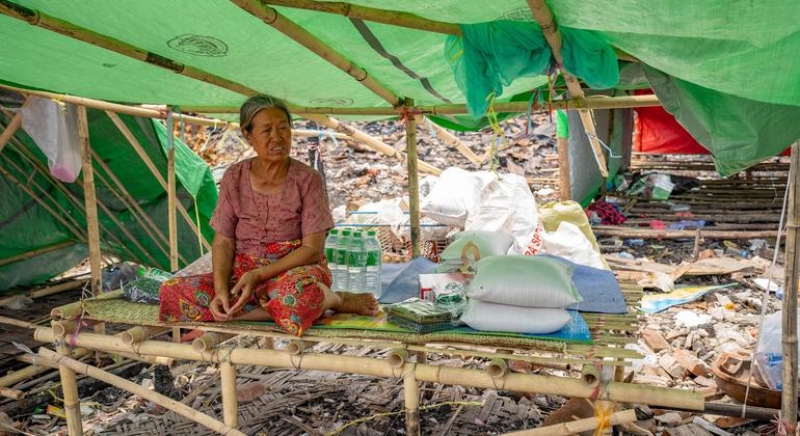- Puppet show enchants Children as Boi Mela comes alive on day 2 |
- DSCC Admin Salam’s drive to make South Dhaka a ‘clean city’ |
- 274 Taliban Dead, 55 Pakistan Troops Killed |
- Now 'open war' with Afghanistan after latest strikes |
- Dhaka's air quality fourth worst in world on Friday morning |
Myanmar faces ruin unless violence ends: UN envoy warns

A woman who was affected by the earthquake in Myanmar sits alongside aid items.
Nearly three months after a catastrophic earthquake struck Myanmar, the country continues to grapple with its aftermath alongside the brutal civil war that has devastated it since the February 2021 military coup.
Since then, “there has been no end to the violence, even though thousands have been killed and thousands more injured,” said UN Special Envoy to Myanmar, Julie Bishop, on Tuesday, while briefing the General Assembly.
“I have stressed consistently that without a ceasefire, a de-escalation of violence, and a focus on the needs of the people, there can be no inclusive, lasting peace,” she said.
Call for ceasefire
Having spoken with survivors amid the rubble of homes, hospitals, and schools, Ms. Bishop said they “wanted the fighting to end so they could live in peace,” as armed clashes continue to obstruct both aid and reconstruction efforts.
Although some parties to the conflict have announced ceasefires, “they have largely not been observed,” she said.
Reiterating her call for an end to hostilities, she stressed that civilian protection “must be the priority and inclusive and sustainable peace a shared goal.”
Without an end to the violence, she warned, Myanmar would continue on “the path to self-destruction.”
Contested elections
Ms. Bishop cautioned that unless the violence ends and an inclusive, transparent electoral process is established, any future election – which the junta plans to contest – risks resulting in “greater resistance and instability.”
“It is inconceivable how an election could be inclusive,” she said, with many political leaders still imprisoned by the regime.
Ms. Bishop also reiterated the UN’s call for the release of all arbitrarily detained prisoners, including democratically elected leaders Win Myint and Aung San Suu Kyi.
Rohingya’s plight
With up to 80 per cent living in poverty, the situation of the mostly Muslim Rohingya minority in both Myanmar and Bangladesh remains dire.
Caught in the crossfire between the Myanmar military and the Arakan Army, Rohingya civilians in their historic homeland of Rakhine State are being subjected to forced recruitment and other abuses.
As aid dwindles, Rohingyas living in Bangladesh’s Cox’s Bazar face serious consequences, including cuts to food rations and education.
“A viable future for Myanmar must ensure safety, accountability, and opportunity for all its communities, including the Rohingya, and must address the root causes of conflict, discrimination, and disenfranchisement in all its forms,” said Ms. Bishop.

